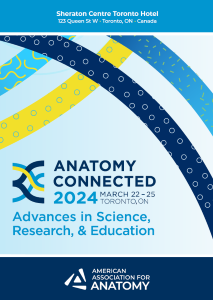Anatomy Education Posters
Poster: Anatomy Education Posters
129 - Mediating Mortality: Evaluating Prosectorship in Anatomy Education
Sunday, March 24, 2024
5:00pm - 7:00pm US EDT
Location: Sheraton Hall
Poster Board Number: 129
There are separate poster presentation times for odd and even posters.
Odd poster #s – first hour
Even poster #s – second hour
Co-authors:
There are separate poster presentation times for odd and even posters.
Odd poster #s – first hour
Even poster #s – second hour
Co-authors:
-

Myriam Nafte, PhD
Adjunct Faculty
McMaster University
Toronto, Ontario, Canada
Presenting Author(s)
Abstract Body : Prosectors facilitate the transition of theoretical knowledge into practical application through the preparation of bodies into cadaveric specimens. They are the quintessential mediators in anatomical pedagogy. Their role, historically utilitarian, now exemplifies a bridge between the life and death of the donor and their subsequent transformation into vital academic resources. This comprehensive research project evaluates prosectorship in various anatomy programs through a combined scientometric and ethnographic approach, to quantify and qualify their pedagogical influence. Scientometric indicators, encompassing cadaver utilization rates, emergent technologies, and publication analyses, are integrated with ethnographic fieldwork, including direct observation and in-depth interviews, to elucidate evolving prosector responsibilities and interactions within the laboratory environment.
Central to this inquiry is the exploration of the ethical dimension of prosectorship. Prosector engagement with the deceased has become increasingly complex and multipurposed: while the role demands exacting professional standards and objectivity it simultaneously venerates and advocates for the sanctity of donor bodies. Their concomitant roles as both educators and moral custodians have come to be instrumental in shaping their own and students’ perceptions of mortality and dissection.
The findings of this study advocate for a recognition of prosectors as key contributors to the medical field, whose work extends beyond the anatomical sciences to encompass ethical mentorship. This presentation showcases scientometric data and ethnographic insights to propose a comprehensive evaluation of the prosector's impact, advocating for evidence-based practices in their training and utilization. The integration of science and ethics in this analysis endeavours to initiate a broader discussion on enhancing the prosector’s visibility and acknowledgment in anatomy education programs.
Central to this inquiry is the exploration of the ethical dimension of prosectorship. Prosector engagement with the deceased has become increasingly complex and multipurposed: while the role demands exacting professional standards and objectivity it simultaneously venerates and advocates for the sanctity of donor bodies. Their concomitant roles as both educators and moral custodians have come to be instrumental in shaping their own and students’ perceptions of mortality and dissection.
The findings of this study advocate for a recognition of prosectors as key contributors to the medical field, whose work extends beyond the anatomical sciences to encompass ethical mentorship. This presentation showcases scientometric data and ethnographic insights to propose a comprehensive evaluation of the prosector's impact, advocating for evidence-based practices in their training and utilization. The integration of science and ethics in this analysis endeavours to initiate a broader discussion on enhancing the prosector’s visibility and acknowledgment in anatomy education programs.

